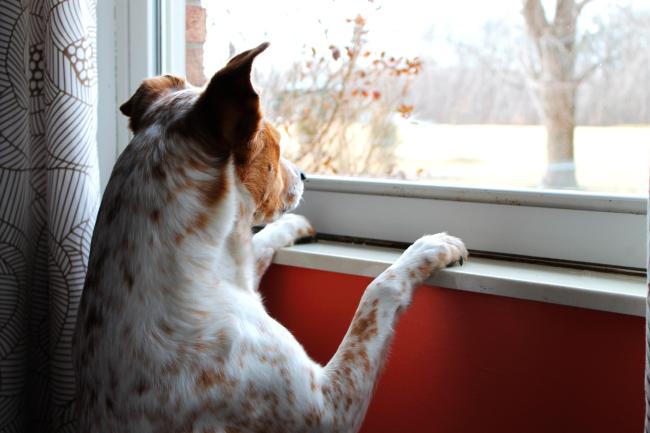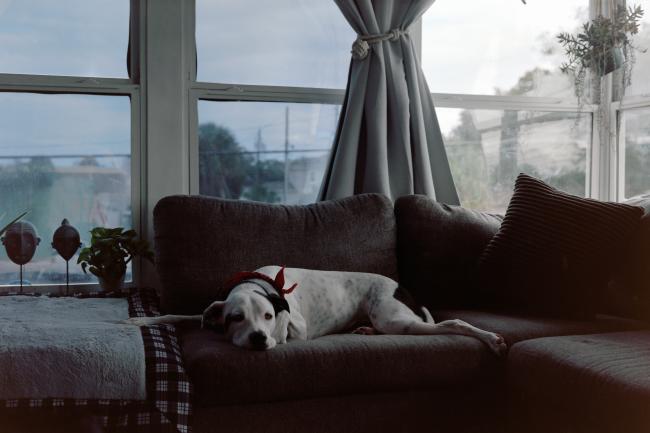Dogs are social animals, which explains why most are not happy alone. In some cases this can become really problematic, with the separation anxiety becoming so intense that the dog cannot be left alone at home. Some dogs are also so attached to their owner that they can also get separation anxiety when they stay with a dog sitter.
Being alone can makes dogs feel unsafe. They are pack animals by nature, and being in a group offers strength and protection. Being alone can trigger emotional issues. No dog likes being alone, but for some it can cause major problems. Separation anxiety may develop at a young age, due to neglect or other traumatic experiences. It can also manifest later, after a particularly stressful experience, such as the owner being away on holiday for a prolonged period, a house move or a rehoming experience. For a lot of dogs the end of the pandemic and the move towards going back to the office / going out more for social visits will lead to potential stress as they are not used to being left alone (anymore). It is important to take this change seriously as a neglect can lead to severe issues in the future.

Training from an early age
In case you have a puppy or young dog at home: You can help prevent separation anxiety by getting your dog accustomed to being alone from an early age. Always start with just a few minutes at a time, and gradually build up to several hours. However, you should never leave your dog alone for an entire day - even dogs that don’t exhibit problematic behavior are unhappier alone than in a group. Also remember: Always remove potential hazards (cables, candles, poisonous food etc.) from your home when you leave your puppy alone. If you regularly need to leave your home for prolonged periods, you might want to consider to arrange for a dog sitter to come and keep your four-legged friend company. Starting with dog sitters for a few hours a day with a younger dog is a good idea as it will get them used to being with other people and help reduce stress in the future.
Dogs that are unaccustomed to being left alone from an early age sometimes go on to develop separation anxiety. It’s important therefore to recognise the symptoms and address the root cause of the problem.

Recognise the symptoms
Whining, barking, destroying furniture, self-harming, pacing and peeing in the home are typical symptoms of anxiety. As are your dog’s refusal to eat or drink when alone, or excessive excitement and hyperactivity upon your return. It’s important to be able to recognise these symptoms, especially if you happen to be a dog sitter! Sometimes a well-behaved dog will suddenly exhibit destructive behaviour or symptoms of stress. This can indicate separation anxiety and must be tackled as such – it’s important to note that this type of behaviour is never intended to be 'annoying'. So, whatever you do, do not punish your dog for his or her actions, and instead be patient and reassuring. Sometimes it can help to install a camera in your home and watch your dog on your smartphone when you are out. Are they sitting in front of the door or constantly walking around? This might be better than loud barking but still is not a good sign and might lead to other behaviours later on! Ideally your dog should sleep/nap whenever you are not home as being left alone should not be seen as stress but rather boredom.
Confidence
Whilst building up alone time is important, the key to success when it comes to separation anxiety is somewhat more complicated. Dogs that suffer from severe separation anxiety tend to lack self-confidence. This might be as the result of a traumatic or stressful experience. The trick to solving separation anxiety is to therefore rebuild their trust. They need to feel reassured that they are living in a warm 'nest' with a 'pack' that won't simply abandon them. So, your number one priority is to provide that warm, reassuring nest. Assign your dog a quiet place of refuge in the home, somewhere you know they feel safe and relaxed. And take your dog for plenty of long walks, engage in lots of play and generally shower them with affection. Make sure your dog has a safe space to sleep when you leave them alone - most of the time it is good not to leave them in a big room/leave the doors open as they might feel that they "have to guard the entire house". Best is a small, safe room like the kitchen / a room they ususally sleep in. Don't forget the water bowl and their (favourite) bed!
Tired and content
Make sure that your dog is both tired and content before leaving them alone. Go for a long walk interspersed with plenty of play to expend energy beforehand. Only leave your home once your dog is thoroughly calm and relaxed. You can also leave your dog with something "calming" to do, like a kong where they can lick something out of (frozen banana, peanut butter for example). Make sure to give this to your dog shortly before you leave so they associate the "positive" with you leaving - this will help reduce stress in the future. Never leave them with something to chew! Anything can be a choking hazard, especially when the dog is a little more stressed when you leave and might try to eat faster than usual.
Check your own behavior
Grabbing your keys, swapping your slippers for your shoes, dashing from one room to the next: you likely exhibit specific behavioral patterns when you’re preparing to leave your home. Your clever canine companion therefore thinks: Help! My pack leader is leaving! So, try performing these same actions when you’re NOT about to leave the house: grab your keys, put your coat on and then simply stay at home. If you 'disassociate' your behaviour from your dog’s separation anxiety, the panic around your leaving will diminish. Only leave the house if your dog is totally relaxed and at ease. Dont make a big deal of leaving the house, just quietly leave (but also don't sneak out!).
If your dog tends to go overboard with excitement upon your return, then greet them in a calm, yet friendly manner. Make it clear that you’re happy to see them, yet avoid encouraging the hyperactivity. Never get angry, but instead offer the reassurance that they crave.
Getting your dog accustomed to being alone
Dogs with severe separation anxiety must get used to your absences gradually. Disappear for short bursts throughout the day by going to another room and returning after a few minutes. Act like nothing’s wrong and reward your dog with a treat if they remain calm and relaxed. Keep repeating this until you actually leave your house for a short period. If your dog finds this too stressful, stop the exercise and begin the process again in a few days. Your dog must learn that being alone is nothing to be afraid of and that it’s not a punishment for any problematic behavior. Again: it's about trust. And building a good rapport with your dog can really help. Do not expect your dog to "get used to it after a while" if she shows signs of stress. Instead, be patient and understanding when training this and give them the time they need to adjust.

Dog sitters
Dog sitters can be the ideal solution for providing your dog company when you’re not at home. However, there’s a catch. Sometimes separation anxiety doesn’t only mean that your dog cannot be left alone; in some cases he or she simply cannot bear to be parted from you, the ‘pack leader’. Your dog may therefore become confused if they are suddenly left with a someone 'new'. If you fail to introduce your dog to your pet sitter in the right way (by gradually building up feelings of security and trust), then it can prove a traumatic experience.
Make sure that you perform an intensive intake and get your dog thoroughly acquainted with the new dog sitter. Take your dog for a long walk with the dog sitter, and subsequently explore the dog sitter’s home together. If you’ve arranged home boarding for your dog, then bring your dog's favourite basket, blanket and other cherished items to make them feel at home. And, make sure that your chosen dog sitter showers your pampered pooch with as much love and affection as you do. That way your dog will rapidly feel confident and at ease.
Note: If your dog suffers from acute separation anxiety, then it’s wise to engage the services of a dog behaviorist.
You need to go back to the office soon or know you will have to leave the house more often by the end of the pandemic? Best to start looking for a pet sitter now to make sure they are a good match for you and your dog!







